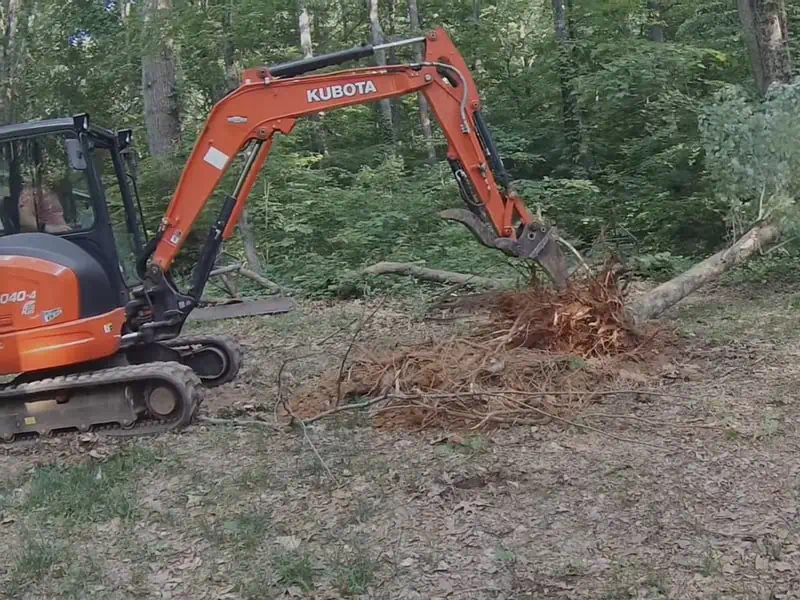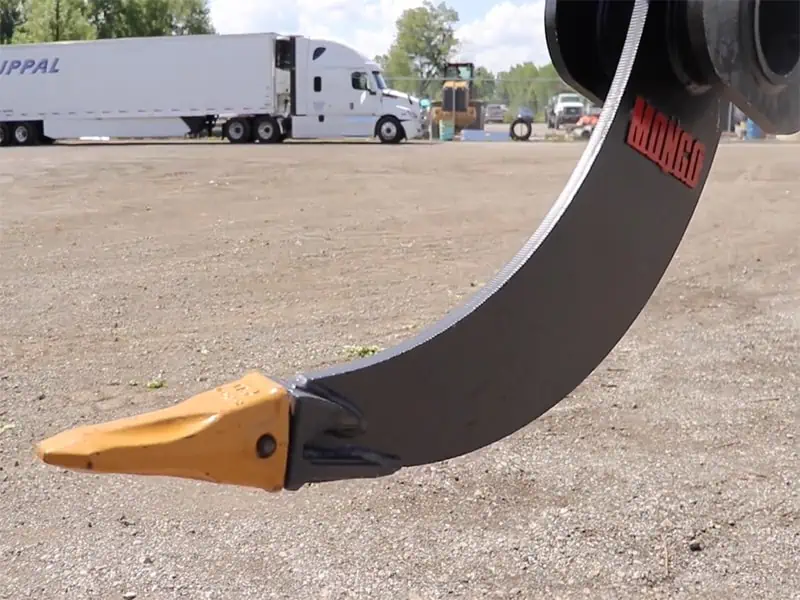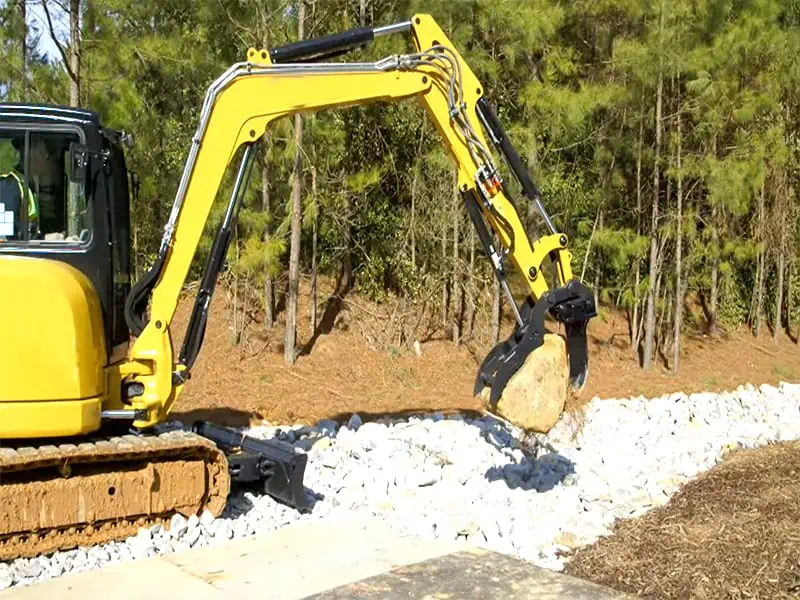UN mini excavator ripper can help increase efficiency and productivity, saving time and effort compared to manual labor or other tools. A mini excavator ripper is a tool you can attach to a mini excavator to help break up hard or compacted soil, rocks, and other materials. It consists of a pointed metal tip designed to penetrate and loosen the ground, making it easier to excavate and remove.
The mini excavator ripper is an pièce jointe used in the construction, landscaping, and mining industries. It is especially useful for working in areas with limited access, such as tight spaces, narrow trenches, and steep slopes, where larger equipment cannot be used. However, it is important to ensure proper safety precautions when using heavy equipment, including a mini excavator ripper.
Heavy-duty ripper teeth are an indispensable tool for mini and 360-degree excavators, allowing them to easily tackle hard, compacted, or rocky ground. Ripping the ground before excavation reduces wear and stress on the machine and bucket, resulting in faster cycle times. Ripper teeth are versatile and can be used for many applications, such as tearing up footings and floor slabs, pulling up tree roots, and more.
Some rippers are designed to withstand maximum excavator breakout force, even in the most challenging, abrasive, compacted, or rocky ground conditions. Whether you are working in construction, mining, or landscaping, our heavy-duty ripper teeth are a reliable and effective solution for your excavation needs.
Table des matières
BasculerThe benefits of mini excavator Ripper

Mini excavator rippers are a valuable tool for excavating hard or compacted ground.
Increased Efficiency:
Ripping up the ground before excavation can save time and effort. The Ripper can easily break up hard soil, rocks, or other materials, making it easier to excavate and remove. It can increase productivity and reduce labor costs.
Reduced Wear and Tear:
Using a ripper can greatly reduce wear and stress on the machine and bucket, allowing the machine to work more efficiently and with less force. It can help prolong the lifespan of the equipment and reduce maintenance costs.
Improved Safety:
Ripping up the ground before excavation can also improve safety on the job site. Breaking up hard or compacted soil, rocks, or other materials prevents accidents and injuries that occur when excavating with a machine or manual labor.
Versatilité:
Mini excavator rippers are versatile tools that are used for a wide range of applications. They can tear up footings and floor slabs, pull up tree roots, and more.
Increased Accuracy:
Rippers can help excavators work with greater accuracy. Breaking the ground before excavation can help excavators achieve greater precision and ensure the work is completed according to specifications.
The types of mini excavator Ripper

Standard Ripper:
The standard Ripper is the most common type of mini excavator ripper. It consists of a single pointed metal tip designed to penetrate and loosen the ground, making it easier to excavate and remove.
Multi-Shank Ripper:
The multi-shank Ripper has multiple pointed metal tips, which can penetrate and loosen the ground more effectively than a standard ripper. It is particularly useful for excavating hard, compacted soil or breaking up concrete and asphalt.
Frost Ripper:
A frost ripper is designed specifically for excavating frozen ground. It features a wide, flat metal blade with serrated edges that can break up frozen soil and ice.
Rock Ripper:
A rock ripper is best for excavating hard rock and other tough materials. It features a heavy-duty metal tip and is constructed from high-strength steel to withstand extreme conditions when working with rock.
Vibratory Ripper:
A vibratory ripper is a specialized tool that uses high-frequency vibrations to break up hard or compacted soil. It is useful for excavating in urban areas where noise and vibration levels must be minimal.
Combination Ripper:
A combination ripper is a versatile tool that combines the functions of a ripper and a bucket. It is ideal for excavation projects where the operator needs to switch between ripping and digging without changing attachments.
How can you use a mini excavator ripper safely?

Using a mini excavator ripper can be hazardous if not done safely and properly.
Read the operator’s manual: Before using the ripper, read and understand the operator’s manual for both the ripper and the mini excavator. Familiarize yourself with the safety precautions, operating procedures, and maintenance requirements.
Wear personal protective equipment:Always wear appropriate personal protective equipment (PPE), such as a hard hat, safety glasses, ear protection, gloves, and steel-toed boots.
Inspect the Ripper:Before using it, inspect it for any damage, wear, or missing parts. Make sure all bolts and pins are secure and properly tightened.
Check the excavator’s stability: Check the excavator’s stability before attaching the ripper. Ensure the machine is on level ground and the tracks are firmly planted.
Keep bystanders clear:Ensure all bystanders are clear of the work area before operating the Ripper.
Start slowly:When using the Ripper, gradually increase the speed and force as needed. Avoid sudden jerking or movements that can cause the machine to tip or lose stability.
Do not overload the Ripper:Do not overload the Ripper beyond its capacity. Use the Ripper only for its intended purpose, and avoid using it to lift or move heavy objects.
Monitor the machine:Monitor the machine for any signs of stress or strain. If you notice any unusual sounds or vibrations, stop the machine immediately and inspect the Ripper for damage.
How to choose a mini excavator Ripper
When choosing a mini excavator ripper, several factors must be considered to ensure you select the right tool for your project.
Application:
The first step in selecting a mini excavator ripper is to consider the specific application you will use it for. Will you excavate hard, compacted soil, break up concrete or asphalt, or remove tree roots? Each type of Ripper is designed for specific applications, so choosing the right tool for the job is important.
Excavator Size and Weight:
The size and weight of your mini excavator are also key factors in selecting the right Ripper. The Ripper should be compatible with the weight and horsepower of your excavator to ensure optimal performance and prevent damage to the machine.
Ground Conditions:
The type of ground conditions you will excavate will also factor in selecting a ripper. A rock ripper or multi-shank Ripper is required to work with hard rock or other tough materials. A frost ripper may be the best choice if you work with frozen ground.
Durability and Quality:
The durability and quality of the Ripper are also important considerations. Look for a ripper made from high-quality materials, such as Hardox® steel, known for its exceptional durability and strength.
Cost:
Consider the cost of the Ripper. While choosing the cheapest option is tempting, it is important to remember that a high-quality ripper will last longer and perform better, ultimately saving you money in the long run.
How to remove Mini Excavator Ripper
- Turn off the mini excavator’s engine and ensure the key is removed from the ignition.
- Position the excavator on level ground and lower the Ripper onto a stable surface.
- Use the excavator bucket to stabilize the Ripper by placing it under the shank and lifting it slightly off the ground.
- Locate the locking pin on the Ripper and remove it by pulling it out or using a pin removal tool.
- Use a pin removal tool to remove the connecting pin that secures the Ripper to the excavator’s arm. Make sure to support the weight of the Ripper as the pin is removed.
- Once the connecting pin is removed, gently lower the Ripper onto the ground and carefully detach it from the excavator’s arm.
- Inspect the Ripper for any damage, wear, or missing parts before storing it.
- Store the Ripper in a safe and secure location, such as a dedicated storage area or rack, to protect it from damage and corrosion.
Conclusion
A mini excavator ripper is a versatile and essential tool for excavating hard, compacted, or rocky ground. It reduces wear and stress on the machine and the bucket, improves cycle times, and increases productivity. Choose the appropriate Ripper based on the job requirements and the size of the excavator. If you need any type of information, you can Contactez-nous now.
